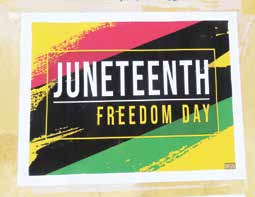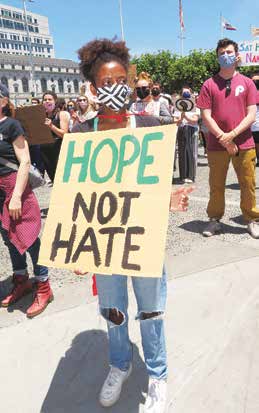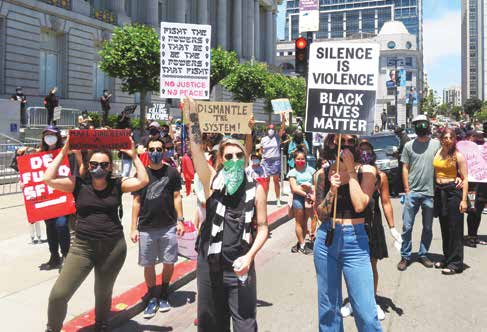
By Andrea Shorter–
COVID-19 might have rained on this year’s Pride parade, but the march for freedom grew stronger, louder, more diverse, and more resilient, making this June 2020 hotter than any July in the past half century.
Since the May 25 murder of George Floyd by Minneapolis police officers, days and weeks long protests and uprisings placing calls for an end to anti-black police brutality at the red hot core rage for justice through dismantling various forms of systemic racism upon which institutional, political, economic, and cultural norms were built and endured for centuries remain, albeit at a simmer.

Meanwhile, the predicted uptick in COVID-19 cases after premature, mismanaged, or disregarded reopening policies and practices across the nation presents further challenges to safeguarding both restless rule followers and blatant deniers venturing more frequently into public spaces during the summer months. Add to the mix an officially declared economic recession, and the continuing antics of a dangerous, unhinged wannabe autocrat POTUS released from bunker protection to stadium rally his apparently dwindling MAGA troops towards apparently diminishing chances of re-election, and we have a near picture perfect dystopia, of America coming apart at the seams.
Then, similar to the historic U.S. Supreme Court ruling on June 26, 2015, that the Fourteenth Amendment required all 50 states to grant and recognize same-sex marriages, there was, 5 years later, another June Pride surprise: a 6–3 decision by SCOTUS affirming federal law embedded in the Civil Rights Act of 1964 as prohibiting discrimination based on sex to include sexual orientation and gender identity.

Even with the most conservative Supreme Court in modern day history—including two Trump appointees—freedom and justice could not be further denied nor delayed to embattled LGBTQ persons simply seeking the right to, and dignity of, work without fear of discrimination, retaliation, or fire.
Upon hearing the news, amidst the tears shed amongst the pain and grief of more lives lost to police brutality since George Floyd, or the government sanctioned militia terror visited upon peaceful protesters on the now Black Lives Matter Plaza in front of the White House, finally, tears of joy also flowed. Finally, there were some just works in the midst of uncertainty and upheaval.
I experienced a particular gladness when this ruling landed four days before this year’s Juneteenth celebration on June 19. Juneteenth 2020 has now passed, and in the midst of today’s cries for freedom and justice, perhaps gained wider notoriety since its origin date when remaining slaves and slaveholders in deep, deep south Texas received news of emancipation in 1865—two and a half years after President Lincoln’s official Emancipation Proclamation on January 1, 1863.

This Juneteenth was all the more special along with the SCOTUS ruling affirming the LGBTQ protections under the Civil Rights Act of 1964, as well as affirming that the Deferred Action for Childhood Arrivals (DACA) cannot be shut down by xenophobic Trump.
Juneteenth as a day of celebrating freedom has existed among African Americans for generations, not secretly shared so much as sacredly shared. Perhaps because for African Americans, after 400 years, freedom still remains as something to aspire to; for white Americans, freedom is something already possessed, and therefore must safeguard against being taken away. When freedom remains tenuous, fragile, under fire, and elusive, celebrating what freedom means within a particular suffragette, diaspora, or journey can understandably become sacred.
By next June 2021, we should all share in and elevate the import of the histories of the Gay Freedom March and Juneteenth to every American. Let’s continue to do away with any remaining silos of celebrating common cause for progressive movement toward freedom and justice. Just as LGBTQ Pride embraces all, Juneteenth belongs to all. Just as we celebrate July 4 Independence Day, we should all be celebrating and commemorating the official emancipation from slavery—not just descendants of slaves.
Parade or no parade, the march towards freedom and justice is on its best footing when we not only share the burdens of our common challenges, but also share in the celebrations of victory, triumph, and overcoming together. As Americans, what could be greater, more prideful, freeing, and just than sharing those celebrations and pursuits of happiness together?
Andrea Shorter is a Commissioner and the former President of the historic San Francisco Commission on the Status of Women. She is a longtime advocate for criminal and juvenile justice reform, voter rights and marriage equality. A Co-Founder of the Bayard Rustin LGBT Coalition, she was a 2009 David Bohnett LGBT Leadership Fellow at the Harvard Kennedy School of Government.
Published on June 25, 2020
Recent Comments